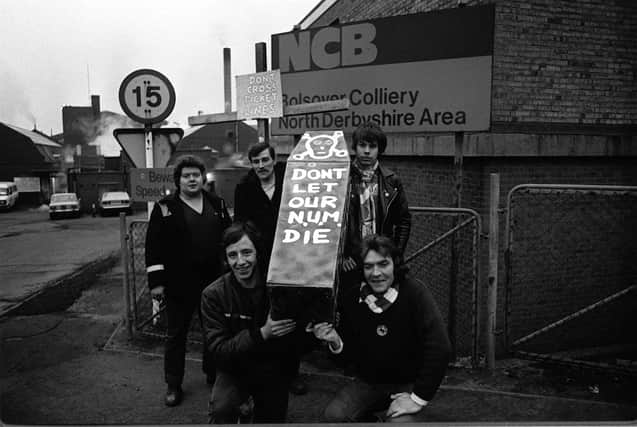Northern Lights: Whatever comes in the months ahead, Sheffield will pull through


There are a number of reasons why I think recognising the 40th anniversary of the events of 1984 is worthy of reflection and recollection.
It was George Orwell's seminal work, 1984, published in 1948, that reflected a number of dangerous trends we see with sophisticated technology today, but also the “enemy" that is always evoked by autocratic regimes and sadly, some elected administrations who – to coin a phrase from history – “have sat too long".
Advertisement
Hide AdAdvertisement
Hide AdBut the year 1984 has a particular resonance for me. I was Leader of the City Council at a moment of substantial turbulence in our political, economic and social history. The Miners’ Strike began in the early spring, and the notorious Orgreave stand-off between police and striking miners in June still rests with many – not least because of the role of the government at the time and, it has to be said, the complicity of the BBC along with much of the media.
I had personally fallen out with Arthur Scargill, not least because a satisfactory settlement of the strike was the last thing on his mind, but because, in part, I had to deal with him at close quarters. The NUM headquarters had moved to Sheffield and the press attention was intense. The late Bill Michie (by then, the MP for Sheffield Heeley), Richard Caborn (prominent, over the years, as a member of the European Parliament and then the MP for Sheffield Central) and myself, were the trustees of the official and legitimate Miners Solidarity Fund.
This was very different to the “slush fund", about which there became so much controversy. We were scrupulous – as we had to be in terms of where the money came from and, crucially, where it went!
As Leader of Sheffield, I led the decision to do everything we could to help miners’ families in and beyond Sheffield. There were still a large number of those working in the pits in South Yorkshire and North Derbyshire who lived within the Sheffield boundary, which gave us a remit for helping, over the subsequent winter, with essential food parcels and support for the children.
Advertisement
Hide AdAdvertisement
Hide AdBut until I read Catherine Taylor's book, The Stirrings: A Memoir in Northern Time, my recollection of other events remains sketchy. Perhaps because so much was happening then – including the stand-off which was later to erupt across the country between local government and Margaret Thatcher's attempts to suppress opposition.
But it was Catherine Taylor’s autobiography of her early years that brought memories flooding back as I listened to her excellent reading of the Audible version.
In the spring of 1984, she took part, as an extra, in a short but impactful film called Threads. Written by Barry Hines – famous for Kes, and directed by Brian Jackson, this film took three weeks to make on meagre budget of £250,000. It was, as you'll have gathered, filmed in Sheffield. The film was first shown on BBC2 and had, even for those days, a staggering audience of 6 million. The impact was profound.
Those old enough to have lived through the early 1960s and the Cuban Missile Crisis will know the feeling of fear that existed, and still persisted during the 1980s, of nuclear Armageddon. Back in 1980, the government put out a ridiculous public information programme described as Protect and Survive. Advice such as putting brown paper over the windows and keeping a supply of bottled water and batteries in the house, contrasted with the stark reality of what had happened in Hiroshima and Nagasaki in 1945, and what would have happened had Ronald Reagan, President of the US at the time, and Mikhail Gorbachev, leader of the Soviet Union, not reached some accord during the 1980’s.
Advertisement
Hide AdAdvertisement
Hide AdThreads graphically illustrated the consequence of a nuclear hit on the city. Local people played their part, with Barkers Pool as a centrepiece. The same Barkers Pool which would later, as with Orgreave, see a stand-off between the miners and police – many of whom had been bussed in from London and other parts of the country.
Sheffield had, of course, been devastated in another way – not by bombs from the sky, but by policy and indifference from central government. The steel industry had been decimated, engineering hit hard by technical as well as political change, and the Full Monty film was to portray the social as well as economic consequence. A film, by the way, which I didn't find terribly funny! And like Brassed Off, based in South Yorkshire, but focussed on Barnsley which caught the poignancy and human tragedy of rapid and unplanned economic and social change.
So here we are, in 2024, with a pending general election, a presidential election in the United States and heart-breaking conflict in the Middle East. At home, local government is on the edge of bankruptcy and the health service is in meltdown. Internationally, the uncertainty of the year ahead must give us all pause for thought.
Yet, one thing stands out in my memory from 40 years ago. The indomitable character of the Sheffield people. It is true of Britain as a whole, but our city remains special. Whatever comes in the months ahead, Sheffield will pull through. That is the stuff of which we are made.